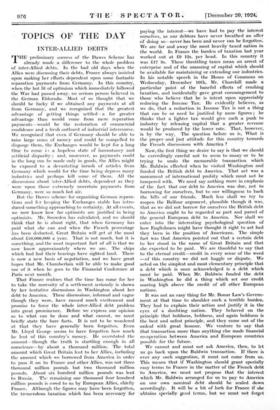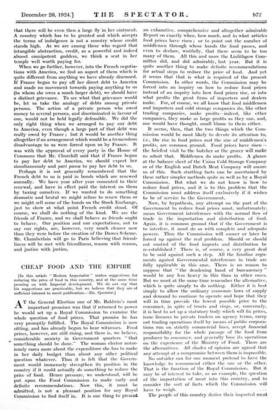TOPICS OF THE DAY
INTER-ALLIED DE liTS
THE, preliminary success of the Dawes Scheme has -11- already made a difference to the whole problem of inter-Allied debts. In the bad old • days when the Allies were discussing their debts, France always insisted upon making her efforts dependent upon some fantastic reparation payments from Germany. In this country, when the hot fit of optimism which immediately followed the War had passed away, no serious person believed in the German Eldorado. Most of us thought that -we should be lucky if we obtained any payments at all from Germany, and we recognized that the greatest advantage of getting things settled—a far greater advantage than would come from mere reparation payments—would be the restoration of commercial confidence and a fresh outburst of industrial intercourse. We recognized that even if Germany should be able to raise large sums of money and could be compelled to disgorge them, the Exchanges would be kept for a long time to come i i a hopeless state of inconstancy and artificial disparity ; and, moreover, as payments could in the long run be made only in goods, the Allies might be exposed to a devastating inrush of articles from Germany which would for the time being depress many industries and perhaps kill some of them. All the discussions about Enter-Allied debts, dependent as they were upon those extremely uncertain payments from Germany, were so much hot air.
But the Dawes scheme for organizing German repara- tions and fcr keeping the Exchanges stable has intro- duced something approaching to certainty. At all events, we now know how far optimists are justified in being optimists. Mr. Snowden has calculated, and we should think that he is about right, that when Germany has paid what she can and when the French percentage has been deducted, Great Britain will get at the most about £10,000,000 a year. That is not much, but it is something, and the most important fact of all is that we now know approximately where we are. The ships which had lost their bearings have sighted land. There is now a new basis of negotiation, and we have great hopes that Mr. Chamberlain will be able to make good use of it when he goes to the Financial Conference at Paris next month.
That France realizes that the time has come for her to take the necessity of a settlement seriously is shown by her tentative discussions in Washington about her debt to America.. These discussions, informal and vague though they were, have caused much excitement and promise to force the whole inter-Allied debt problem into great prominence. Before we express our opinion as to what can be done and what cannot, we must briefly state the bare facts. It is not to be wondered at that they have generally been forgotten. Even Mr. Lloyd George seems to have forgotten how much he lent of this country's money. He overstated the amount—though the truth is startling enough in all conscience—by about a thousand million. The total amount which Great Britain lent to her Allies, including the amount which we borrowed from America in order to pass it on to France and other Allies, was not three thousand million pounds but two thousand Million pounds. About six hundred million pounds was lent to Russia. -11-i2 remaining one thousand four hundred Million pounds is owed to us by European Allies, chiefly France. Although the figures may have been forgotten, the tremendous taxation which has been necessary" for paying the interest—we have had to pay the interest ourselves, as our debtors have never breathed an offer of doing so—never has been and 'never can be forgotten. We are far and away the most heavily taxed nation in the world. In France the burden of taxation last year worked out at £9 12s. per head. In this country it was £17 9s. These throttling taxes mean an arrest of enterprise and of the amassing of capital which should be available for maintaining or extending our industries. In his notable speech in the House of Commons on Wednesday, December 10th, Mr. Churchill made a particular point of the baneful effects of crushing taxation, and incidentally gave great encouragement to those who believe that he is intent upon appreciably reducing the Income Tax. He evidently believes, as we do, that a reduction• in Income Tax is not a thing that can be or need be justified by mere figures ; he thinks that a lighter tax would give such a push to industry by releasing capital that a greater revenue would be produced by the lower rate. That, however, is by the way. The question before us is, What is the proper and just attitude for this country towards the French discussions with America ?
Now, the first thing we desire to say is that we should be exceedingly careful not to seem to unsay or to be trying to undo the memorable transaction which Mr. Baldwin effected when he visited Washington and funded the British debt to America. That act was a monument of international probity which must not be tampered with. We need say nothing more in emphasis of the fact that our debt to America was due, not to borrowing for ourselves, but to our willingness to back the bills of our friends. Much less shall we try to reopen the Balfour argument, plausible though it was, that as we did not borrow for ourselves the British debt to America ought to be regarded as part and parcel of the general European debt to America. Nor shall we enter into the interesting psychological question of how Englishmen might have thought it right to act had they been in the position of Americans. The simple fact was that America pointed out that a certain debt to her stood in the name of Great Britain and that she expected to be paid. We are thankful to say that to the eternal credit—credit in every sense of the word —of this country we did not haggle or dispute. We acted on the simplest and most elementary principle that a debt which is once acknowledged is a debt which must be paid. When Mr. Baldwin funded the debt in Washington he did a thing which set our credit soaring high above the credit of all other European nations.
It was not an easy thing for Mr. Bonar Law's Govern- ment at that time to shoulder such a terrible burden. They had to explain their action and justify it in the eyes of a doubting nation. They behaved on the principle that boldness, boldness, and again boldness is the best and safest principle, and they came out of the ordeal with great honour. We venture to say that .that transaction more than anything else made financial co-operation between America and European countries possible for the future.
We cannot and must not ask America, then, to let us go back upon the Baldwin transaction. If there is ever any such suggestion, it must not come from us. This means that if Washington should grant specially easy terms to France in the matter of the French debt to Atherica, we must not propose that the interest which Mr. Baldwin arranged for us to pay to America on our own nominal debt should be scaled down accordingly. It will be a bit of luck for France if she obtains specially good terms, but we must not forget that there will be even, then a large fly in her ointment. A country which has to be granted and which accepts the terms of indulgence is not a country whose credit stands high. As we are among those who regard that intangible abstraction, credit, as a powerful and indeed. almost omnipotent goddess, we think a scat in her temple well worth paying for.
When we go further, however, into the French negotia- tions with America, we find an aspect of them which is quite different from anything we have already discussed. If France began to pay off her direct debt to America and made no movement towards paying anything to us (to whom she owes a much larger debt), we should have. a distinct grievance. To see what that grievance would be, let us take the analogy of debts among private persons. The action of a private person who owed money to several persons, and discriminated in favour of one, would not be held legally defensible. We did the only right thing when we arranged to pay our debt to America, even though a large part of that debt was really owed by France ; but it would be another thing altogether if an arrangement which would be a tremendous disadvantage to us were forced upon us by France. It was with the approval of every party in the House of Commons that Mr. Churchill said that if France began to pay her debt to America, we should expect her simultaneously and pan passu to pay her debt to us.
Perhaps it is not generally, remembered that the French debt to us is paid in bonds which are renewed annually. We have year after year consented to their renewal, and have in effect paid the interest on them by taxing ourselves. If we wanted to do something dramatic and brutal we might refuse to renew them or we might sell some of the bonds on the Stock Exchange, just to show at what point French credit stood. Of course, we shall do nothing of the kind. We arc the friends of France, and we shall behave as friends ought to behave. Our position and our expectations, not to say our rights, are, however, very much clearer now than they were before the creation of the Dawes Scheme. Mr. Chamberlain will go to Paris believing that friend- liness will be met with friendliness, reason with reason, and justice with justice.











































 Previous page
Previous page